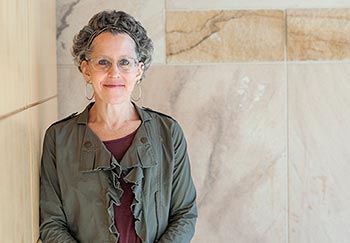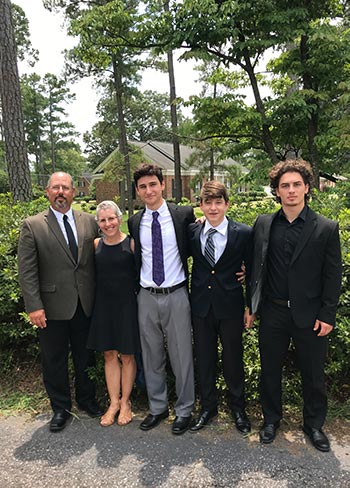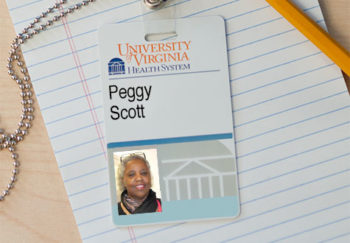
Krista Genevieve Farris contributed this post. She was diagnosed with a fast-growing type of breast cancer in September 2018. She underwent a double mastectomy and continues to receive treatment at UVA.
One of the first sentiments I uttered when I was diagnosed with HER2 positive, hormone receptive invasive ductal carcinoma last year was that I did not want to “become breast cancer.” Little did I know how much marketing plays a role in breast cancer and how difficult it is to get away from the disease.
Indeed, while I was still digesting my diagnosis and was not ready to share it with anyone outside of my family, I had to hustle through a cheery pink gauntlet at work to get to the exercise studio to lead a class. I hid in a bathroom stall crying, trying to gather myself after a fundraising volunteer asked me to sign a paper ribbon to put up on the wall to honor someone with breast cancer.
I realized at that moment, for better or worse, breast cancer gets a ton of attention. The upside is that there have been major strides when it comes to available treatments. The downside is that there can be a lot of pressure to fulfill society’s image of what living with breast cancer should look like.
We Don’t All Rock the Bald
When I was a teenager in the 80s, if we discussed breast cancer at all, it was often in hushed tones in a darkened room. It was as if we all thought we would catch cancer if we uttered the word.
Now, abundant commercials would have you believe people who face breast cancer are all female. That “we” all wear cute beanies or rock the bald while climbing mountains every morning and cooking meals for extended family at our beach house on the weekends.
Advertisers would have us believe that “we” don’t miss a day of work due to treatments. That “we” drive carpools and wear t-shirts on our perfect chests that confirm, “Yes, these are fake. My other ones tried to kill me.” And, if “we” haven’t chosen reconstruction, we have a cool tattoo boldly designed for just this occasion to be inked across our chests.
Most difficult to deal with, sometimes, is that advertisers would have us believe that there is a beginning and an end to our “battle.” They send us on “survivor” laps around the local track with onlookers high-fiving us and giving us a standing ovation to honor our “victory.”
Living with Breast Cancer: What It’s Really Like
On some level all the enthusiasm and optimism is a blessing. I can openly talk about my treatment. And being able to talk about things has helped me emotionally. On a larger scale, society’s willingness to talk about the disease means breast cancer research is the target of extremely successful fundraising efforts. Meanwhile, research regarding many other forms of cancers and other fatal diseases is grossly underfunded.
Cancer Care at UVA
Krista’s care team at UVA includes:
- Medical oncologist Trish Millard
- Surgical oncologist Shayna Showalter
- Gynecological oncologist Kari Ring
- Plastic surgeon Chris Campbell
- Endocrinologist Ralf Nass
- Infectious disease specialist Cirle Warren
- Midlife health specialist Carolyn Wilson (Center for Midlife Health)
However, because breast cancer is sometimes painted positively pink and rosy, some people were convinced that there was no way for me to die from the disease. They thought after a few months of treatment, I would be as good as new. But I knew that even after my double mastectomy and rounds of hard chemo, I would still be facing a year of targeted drug infusions, further surgery to remove my ovaries and a 5-7 year course of hormone therapy.
Images of unbridled vitality and ambitious activity do not reflect most patients’ realities. The fact of the matter is that every patient does breast cancer in a different way, just as every person does life in a different way. There are multiple different types of breast cancer, tumors, pre-existing conditions and treatment options. In addition, patient personalities, lifestyles, and life experience mean that no two cases are ever alike.
It is true that breast cancer is a predominantly female disease. 1 in 8 women will face a cancer diagnosis during her lifetime. As such, culture would have us smack a smile on it and be pretty in pink. And perhaps that is why we “superwomen” are primed and poked by society to cover it up with cosmetics and cute mottos and embrace it like a hero.
While positive images of people going through treatment and smiling photos of bald women make a diagnosis a little (just a little) less scary, they can also make individuals facing the disease feel less-than. Why am I unable at times to walk around the block without pain? Why do my mouth sores make it hurt to smile?
There is a realistic, attainable middle ground that is neither dismally dire, nor overly saccharin. But it involves something that might be difficult to do. Society must let women admit they are sick and quit asking them to smile and frame everything, even illness, as an achievement. A positive attitude alone will not cure cancer. But seeking to understand the reality of the heterogeneous disease and the diversity of patients can help.
Breast cancer treatments — surgeries, chemotherapy, targeted therapy, hormonal therapy and radiation — can keep the disease at bay or prevent recurrence. But not every patient can receive every treatment that might work for their particular type of cancer. We may have drug reactions, preexisting health conditions and a host of other challenges.
Folks with breast cancer do die from the disease. Women and men with breast cancer do die with the disease. Other patients will die without detectable breast cancer but perhaps from the collateral damage treatments can render on organs. The point here is not to sound negative but to inject useful realism into the discussion.

The cloaking of breast cancer as a battle fought while smiling not only affects the patient but caregivers too. At one point this winter, my body was having a very difficult time dealing with the effects of chemotherapy on my liver. I was ill with a c-diff infection. My husband took my sons to see the latest “Wonder Woman” movie for some cancer-free fun. When they returned home, my husband cried in frustration. The pre-movie ads had featured female breast cancer “patients” sporting the trendy beanies they bought from the advertiser as they finished triathlons and led board meetings.
The images on screen were a far cry from what he and the kids were experiencing. And, at that moment, he felt the frustration of this expectation that breast cancer isn’t supposed to slow us down or even get us, any of us, down. All you need are some gold superhero wrist cuffs (or a new beanie and tri-bike) and POOF — “You’ve Got This!” You’ve all won and looked good doing it!
Nope. That is fantasy.
The battle language of waging war against the disease seems counterintuitive to me, especially when paired with smiling images. War is not pretty. Positive thinking alone does not win wars. There is no greater stress than that felt on a battlefield. And since stress impedes healing, why frame breast cancer as a battle?
So why do people suggest that those of us receiving cancer treatment rise every day itching for a fight? If I die from breast cancer, I will not have lost a battle, I will have lost my life. My life is not a battle.
Why I Didn’t Write a Book
Despite the differences, the one thing which all of us living with a breast cancer diagnosis need is the latitude to continue to be ourselves. We shouldn’t have to fulfill some image of what outsiders want to see when they view someone with breast cancer – even if reality makes others uncomfortable, even if we don’t project constant positivity, even if we don’t want to write a book or journal about it or strive to qualify for the Boston Marathon while coping with chemo and its aftermath.
Don’t get me wrong. There is nothing wrong with discovering triathlons or any other hobby by way of breast cancer. But there are breast cancer patients who can’t participate in their pre-treatment passions. I could not continue to teach the fitness classes I taught. I haven’t been able to keep up with my job as a writer and a fitness leader while going through multiple surgeries, chemo, targeted treatments, hormonal therapy and dealing with infections.
I am back to work now, but I know I have days ahead when I will be recovering from further surgeries and, well, everything else. A cancer diagnosis does not make one superhuman. However, a cancer diagnosis can reveal your super humanity and make you very grateful for all the “cans” you can do.
Breast cancer is neither a bed of roses, nor is it war. Just like anything in life, it is nuanced.
Personally, it has made me dig deeper into who I am, not what I am. I am a writer, yet the one thing I did not do while riding the emotional rollercoaster of chemo and repeated surgeries was write – despite others constantly urging me to journal, write articles about cancer or compose a book.
I felt like writing was one of the most destructive things I might have done at certain points. First, I did not want or need the isolation involved in writing. I already felt socially deprived since I could not teach the group exercise classes that were a part of my pre-cancer life.
Second, chemo and illness left me unable to focus and think clearly. Chemo often left me unable to conjure clear thoughts and sentences.
And, perhaps most importantly, there is much I do not want to remember about feeling so sick. In the end, I do believe my body will store memory. Visceral experience will trigger thoughts when my mind is ready to process feelings.
Strangely, not everything has been terrible. I have felt intense contentment at times because of cancer. I have noticed more beauty, striking beauty, like how the September skies can turn fuchsia before dusk when I’m on the way home to Winchester from a treatment in Charlottesville.
The collaboration I witness amongst “my team” at UVA has enlivened my quest to figure out ways I can work better with others, both professionally and personally. The outpouring of support from my clients, friends and family has shown me that the way I have lived my life so far has made an impact on people and that I have purpose. That is an incredible gift: to know that I am loved and respected.
I am not a victim. I am not a hero. I am not a soldier on a battlefield. I am not breast cancer. I am alive.


Great article. Thank you for posting.
Thank you Krista Farris for writing your inspirational story, filled with reality!! My niece died of breast cancer in her early years and all I hear from her family is she fought a good battle. While I only imagined that the surgery, therapies, and loosing one’s hair were draining, I was still surprised she passed – I have been sold by media and marketing that no one dies from cancer. Thank you for succinctly pointing this out. I wish for you better days ahead health-wise and many, many more joyful years ahead with your beautiful family!
Great article!
Krista bless you for sharing. Many hugs 🤗 Mom
This is excellent. I agree the disease is commercialized and that makes it difficult to live it. I felt the same way about the “pink” at times it made me see “red”. I do not want to fight a battle.. but just live my life!
This really resonated with me. “I am not a victim. I am not a hero. I am not a soldier on a battlefield. I am not breast cancer. I am alive.” I love this. I have the exact same cancer, and my thoughts parallel everything written in this article. You have put my thoughts into words. I shared this with all my friends and family members because it is exactly how I feel! Thank you for an amazing article.
You made me feel not alone. My husband and I are. I go to UVA also, and share many of your doctors. You are right on the money. I haven’t lost my hair, and I have chosen to remain flat. The doctors are awesome there! But out in public it’s a whole different game.
Many thanks to all who have read this, shared this story or their own and offered support to me and others dealing with cancer. I offer warmth, stamina and peace to all of you.